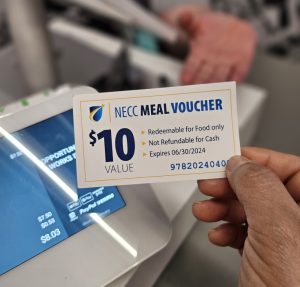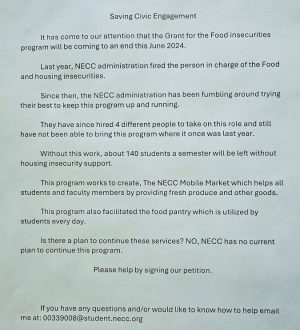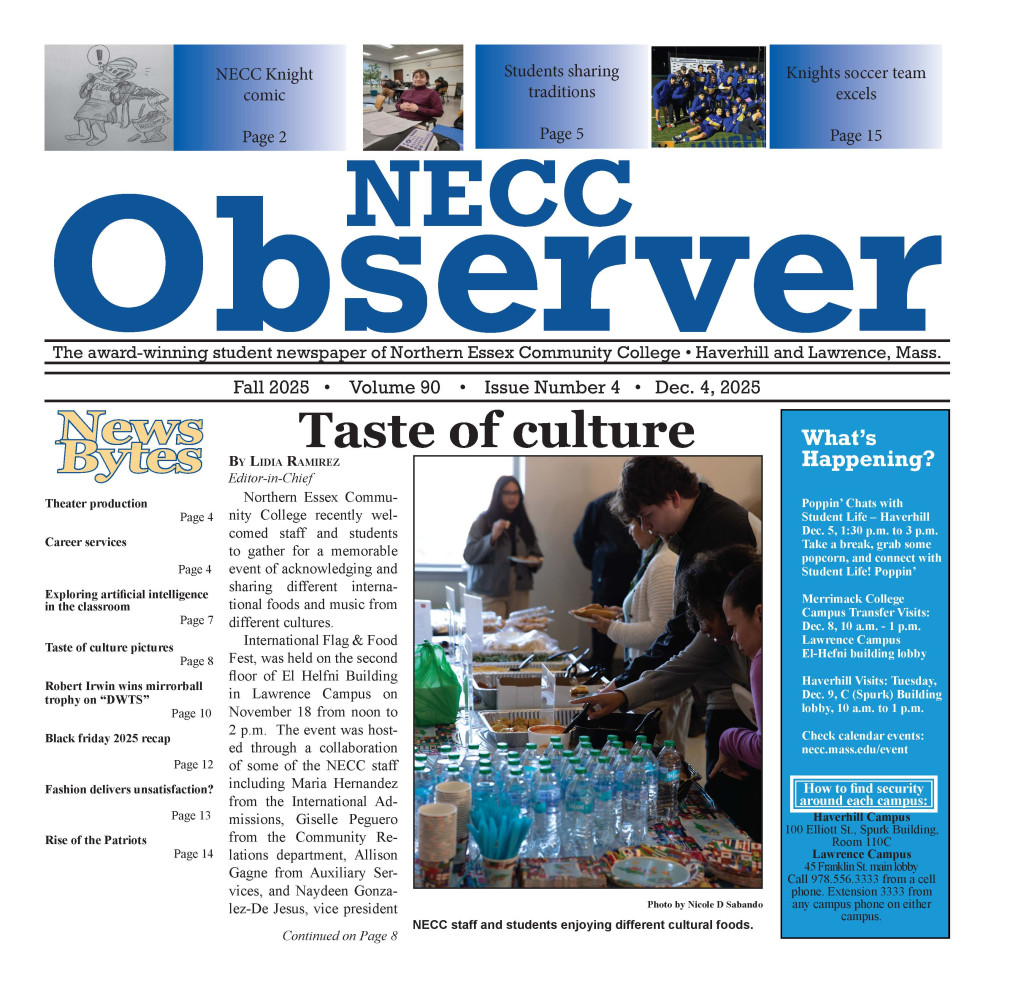
Students create petition about food, housing, civic engagement resources.
On April 2, there was a petition spread by Student Government Association SGA about food and housing insecurity titled Saving Civic Engagement. It called for students to sign up on behalf of the services the Civic Engagement, Service-Learning, and Community Resources Coordinator, Janel D’Agata-Lynch, used to oversee before her position was retrenched.
Those services were:
Food Insecurity assistance that includes programs like Free Monthly Mobile Market, Free Food Pantries on Haverhill and Lawrence campuses, and freezers with frozen foods in both campuses.
Housing insecurity assistance, according to students’ needs, whether they had children or not, they were accommodated by a nonprofit organization, and followed-up by D’Agata-Lynch. As a licensed social worker she followed every case by case.
Free feminine products were available in bathrooms in both campuses.
Clothing assistance, students had access to vouchers from secondhand stores.
Civic Engagement, which involves programs across campuses promoting voting among students. Highly needed now with a presidential election coming.

The SGA, known for its strong voice advocating for students’ concerns, was asking NECC students for their signatures as their support. Specifically, the SGA was concerned for the future of the food access programs that D’Agata-Lynch started in 2022 with a grant she applied and obtained for this cause from the Department of Higher Education.
Here there is an excerpt from the petition and please see it in full in the photo above.
“It has come to our attention that the Grant for the Food insecurities program will be coming to an end this June 2024 … the NECC administration has been fumbling around trying their best to keep this program up and running.
“Without this work, about 140 students a semester will be left without housing insecurity support. Is there a plan to continue these services? NO, NECC has no current plan to continue this program.”
Elijah Antunes, President of SGA and Representative of Executive Committee, All College Assembly ACA, said “when we found out that after Janel (D’Agata-Lynch) left, Francellis (Quinones) came into that position, it became of consolidating and the effort still seemed to be there, but it just isn’t. It wasn’t at the level that it was previously.” Antunes added that as the food grant would expire in two months, they are concerned about the future of food programs.
Quinones was hired as Chief Officer of Justice Equity Diversity and Inclusion (JEDI) director in July 2022. She is no longer working for NECC since November 2023, but she was on leave earlier.
On Sep. 7, 2023, in the Board of Trustees meeting, Randall Correa was announced as the newly hired Food Access Outreach Coordinator. It was announced in the website that he and Quinones would work “closely at utilization rates for the NECC Mobile Markets and food pantries, which have declined significantly in recent years.”
The $180,000 grant for free food access to students
The Massachusetts Department of Higher Education DHE/ARPA Food Security Program Food Access Project, granted $180,000 to NECC, to be used according to the plan D’Agata-Lynch proposed to help students with food insecurities, during 11/21/22 to 06/30/24. The grant is meant to be solely and exclusively used as the title says, for food for students.
In one year, since D’Agata-Lynch left NECC in May 2023, the food pantry and the freezer with free frozen food known as Smart Meals in Haverhill was dismantled. The Free Mobile Market with fresh and seasonal produce and groceries disappeared. No feminine products were refilled. Student point of contact for any food or housing insecurity or any basic need was not announced. All the other programs mentioned above know as Civic Engagement vanished.
Duties assigned to new dean of students
Jason Arey started his new role in NECC last August 2023 as dean of students. This position “oversees a variety of student support services in the areas of Counseling and Psychological Services, Compliance, Veterans and Military Services, Student Life, the Center for Accessibility Resources and Services, Community Standards, Student Government Association, and the Care and Concern Outreach Team, including student conduct and student wellness initiatives. The dean is also responsible for oversight and development of extracurricular and student retention activities at the college,” according to the NECC website.
However, as Quinones was on leave before leaving NECC the new dean of students, Arey, was assigned to take over the food programs and oversee the DHE/ARPA grant. Here are the current student food programs he is managing:
Food Boxes with some produce and canned food were offered to students since November ‘23. These boxes are coming to NECC under a contract with an outside company UTECH, and mostly known as MADD love food boxes.
Market Basket Gift Card, students can access up to one $50 card per academic year.
$10 Food Voucher, students receive four vouchers $10 each to buy food in the cafeteria or the bookstore in Haverhill campus, and $3 meals in Lawrence campus.
Food Pantry in Lawrence campus, only under appointment, students can shop for free in the food pantry.
Snack Bags, this recent initiative proposed by Arey allows students to request a snack bag for the weekend. This includes crackers, fruit cup, cereal among other bites.
Arey’s statistics from Dec. 31, 2023, to April 5, since he took over, shows that 359 students have received support from all these food program.
Regarding the voting initiative, Arey said “we have a couple of different groups that are nonpartisan, that focus on voter registration,” who will come to campus, one of them during the Spring Jam, and they will help students to register to vote.
Arey said students can access feminine products through the Lawrence pantry. He gets them through the Dignity Matters organization.
Arey also said the grant included a budget to hire a full-time assistant who would take care of this initiative until the grant expires, June 30. However, he said the person they hired quit and applied for another position within NECC and that the assistant position is vacant. As the budget can not be used for other purposes, that money will be refunded, he said. At the same time, he said there are more funds available but they have to spend it before the deadline.
“It is sad, but I’m going to try not to (return money.) But even if … I spend every single cent in all of the food lines that I’ve just talked about, the salary line is still there,” he explained.
No more food grants?
What is going to happen when the grant is over or expired? The student trustee, Zeke Vasquez, in the last Board of Trustees meeting spoke up. He explained he was concerned that there was no plan to continue with food programs but before the meeting he said he had a conversation with Provost Paul Beaudin and Arey.
“They have promised that they are currently working on extending the grant or finding new funding through the Department of Higher Education,” Vasquez said.
“I hope that we are able to hold them accountable. Because that is the whole reason that we are here … Last year we had similar issues which were promised very similar things, and at the end of the year, unfortunately, we’re still looking for those programs and we’re hoping that there was more active support,” Vasquez said.
However, President Lane Glenn said “solving that is not going to happen through one-time grants” He asked Arey, “how much is our grant Jason? We are not to solve this with $100,000 grants from DHE. It is too big a challenge. It’s just not going to happen. So, our advocacy is going full throttle into getting more money into students’ hands. I encourage the students and others involved in this to try that.”
Glenn said that “other structural things around increasing student aid by Pell Grant aid. Those are the kinds of things that over time can make a difference.”
Indeed, in an interview after the meeting, this same thought was reinforced by the Vice President Lawrence Campus and Community Relations, Noemi Custodia-Lora, “you know grants are something that they’re very limited. We do not know how, if, or how much money will be available in grants in subsequent years. So that’s the reason why the college is looking into more sustainable solutions. To really help the students.”
Near the deadline for this edition Beaudin interviewed by this reporter said he and Dean Arey have a “plan three prompt approach” which consists in advocacy for student to get more money through Pell grants, access to local public assistance or state programs and working with Student affairs.
When asked about housing insecurity, Beaudin said the NECC website has contact information of the Care and Concern Outreach Team, which is a multidisciplinary team within NECC. When asked about who a student may contact for domestic violence assistance, Beaudin said the NECC website also had information of a nonprofit organization to reach out to.
Hope on the horizon, for now
Karen Rooney, executive director of development institutional advancement which is a fancy title to say that “she works helping to secure grants and implement them.”
Rooney said NECC the grant is underspent. She explained NECC has asked to repurpose some of the money to “reallocate” more sources of food for students. She said the Department of Higher Education confirmed they have it in consideration, but it is not guaranteed yet.
Also, NECC has asked for an extension of the grant until Dec. 31, 2024.
In any case, if you are a student going through food or housing insecurity or are in need of any of the above services, please I encourage you to contact the Dean of Students, Jason Arey at jarey@necc.mass.edu.

